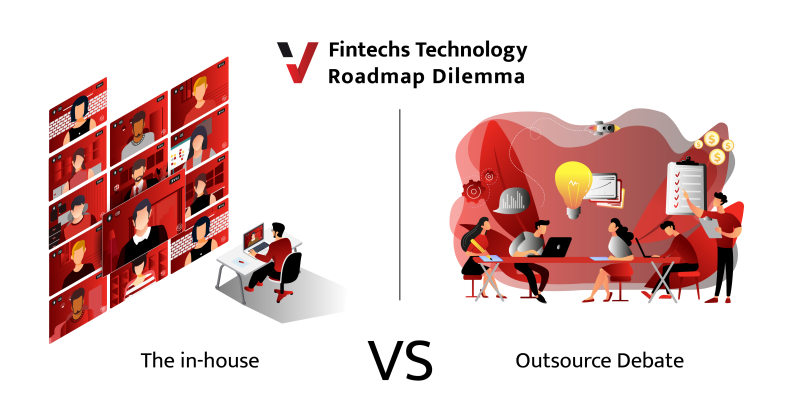Fintechs: The in-house vs. outsourcing debate!?

We have been hearing about fintech in every conversation for the last few years- even though this is a 21st-century phenomenon, it has only grown in credibility and popularity in the previous decade. Fintech is the amalgamation of finance and technology, and its root can be traced back to 1918 when Fedwire enabled the first trans-Atlantic money transfer. It might be very primordial for this generation but a massive leap for that time.
With the first ATM in 1967 by Barclays ushered in an era of digitalization in finance. With bank mainframe computers, the online revolution, and the introduction of PayPal in 1998, we were headlong in the journey towards mainstream fintech banking services. Today, fintech services provide agility and convenience, helping it usurp over traditional banking sectors.
The global fintech technologies market size was valued at $110.57 billion in 2020 and is projected to reach $698.48 billion by 2030, growing at a CAGR of 20.3%. Fintech in Africa is the second-fastest-growing market globally. Because of its high density of population, internet and smartphone penetration, poor administrative infrastructure, and a huge section of the society which is unbanked or underbanked and lack of access to formal financial services like credit and insurance.
In 2021, Fintech startups in Africa raised $300 million, nearly two-thirds of the total investment seen in the continent. Fintech startups in Africa like OPay, Tala, Chipper Cash, Bayport financial services, and Flutterwave are gaining popularity. The Central Bank of Nigeria even granted telecom giants- MTN Nigeria and Airtel Africa to join the ranks with Vodafone M-Pesa, to start financial offerings from their platforms.
In 2021, Fintech startups in Africa raised $3 million, nearly two-thirds of the total investment seen in the continent. Fintech startups in Africa like OPay, Tala, Chipper Cash, Bayport financial services, and Flutterwave are gaining popularity. The Central Bank of Nigeria even granted telecom giants- MTN Nigeria and Airtel Africa to join the ranks with Vodafone M-Pesa, to start financial offerings from their platforms.
Nigeria is leading the fintech revolution in Africa, followed by South Africa and Kenya, but other countries are slowly gaining ground.

Different types of fintech
Today, every organisation and industry needs fintech support- some have in-house departments, while others outsource this to experienced professionals while focussing more on their core competencies.
Today, fintech has applicability in every sector for healthcare, education, eCommerce, cryptocurrencies, NFTs, and Metaverse.
Some of the core fintech categories are:
- Lending
- Payments
- International Money Transfer
- Personal Finance
- Equity Finance
- Consumer banking
- Insurance
Which are the outsourcing hotspots in Africa?
The fintech industry is an ever-expanding and shape-shifting domain. It becomes very difficult to stay abreast with all the newer advancements in the other related departments needed to run an organisation and help stay profitable.
Startup organisations are dominating the fintech sector. These companies often function on a shoestring budget, with the lion’s share of it being redirected in research and development and strengthening their core competencies. It is best to outsource their ancillary departments like technical support, customer care, and back-end services in such scenarios.
Fintech startups are now serving across multiple categories. In Nigeria, 27% of Fintech startups are multi-category, followed by South Africa at 22% and Kenya at 21%. Technology enables fintech brands to diversify and reach a larger user base.
South Africa is emerging as the top choice for intra-continental outsourcing and attracting top fintech institutions from across the globe. This county is promoting better BPO services, and South African professional qualifications are comparable to those in the United Kingdom. As the outsourcing market expands, many exceptional development teams with good English and technical skills become accessible. Clients from the United States and Europe can also profit from South Africa’s time zone.

The other countries in the African subcontinent that are thriving hotspots for tech outsourcing provide the right support to the booming African fintech organizations are Ethiopia, Nigeria, Kenya, Ghana, Mauritius, and Madagascar. Sub-Saharan African regions are providing comprehensive services and are emerging as a self-reliant region. In a recently conducted survey by Moorwand, Fintech companies who outsource to specialist partners can generate additional revenue by up to £1 million. Collaboration and outsourcing help to fuel the growth of this industry. As per a PwC report, 20% of all FinTech businesses outsource their technological requirements, while 65% are on the verge of outsourcing.
How is outsourcing beneficial to fintech organizations?
Cost-effective solution
It is less expensive to outsource technology than to develop it in-house. This is why using white label software rather than developing one with an internal team saves a FinTech company 35% of the time and money. According to Deloitte, 59 percent of businesses outsource their technology to save money.
You save money on:
- Recruitment and training
- Salaries
- Saving money on developmental downtime
Improved flexibility
An unsatisfactory recruit can often hinder the progress of your work, and hiring specialised in-house resources can lead to the draining of your resources without any additional benefits. Co-sourcing or outsourcing can help to:
- Scale up or down delivery teams
- No need for hiring. Get specialist support
- No long-term commitments.
Accelerated speed to market
Outsourcing technologies, according to Deloitte, can cut the time it takes for a product to reach the market by up to 21%. Time is of the essence for a highly-competitive market like FinTech, and even a day’s lag can cost you thousands of dollars.
Working with an outsourced technology business can improve your product’s quality while enhancing its speed and flexibility. In reality, you pay less and receive greater value for your money. Successful FinTech companies outsource most of their technology rather than developing it from the ground up.
Choosing the right collaborator can help you actualize your true potential
Established brands often have the resources to cultivate the ancillary resources required to run and scale their business, and startups often lack these resources, and outsourcing is a tremendous solution. Even bigger companies and MSMEs are taking this route of specialised resources for its many advantages.
CIT Vericash is a leading platform that is helping to drive digital transformation and financial inclusion. With over 25 years of experience in delivering software solutions and services. With their advanced omnichannel solutions, FinTech organisations in Africa can benefit.
CIT Vericash provides real-time solutions customised to meet the needs of every business. With its state of the art agile digital Fintech Enablement Platform with its Fintech Factory, it provides a very flexible environment for early stage Fintechs still going about deciding their technology strategic roadmap. From ideation stage all the way to their first MVP product version to launch to market, Fintechs are able to easily test their ideas, business models, and create prototype that would easily transition into their beta product version ready for a soft launch.
The debate on whether fintech organisations should choose to keep every department intrinsic or outsource- we are still waiting for the coin to drop on that. But the trend shows that more and more organisations are approaching specialised outsourcing agencies to expedite their process and stay ahead of the competition.
About CIT Vericash
CIT VERICASH is a division of CIT GLOBAL, an international leading provider of innovative eCommerce and mCommerce software solutions and services with solid expertise spanning 25 years, since its establishment in Toronto, Canada in 1993. By applying CIT Global’s dedicated centers of excellence and its specialized leading products, in cooperation with its strategic partners, the company has delivered innovative and award-winning solutions to its clients in more than 48 countries, serving leading brands from North America, Europe, Asia Pacific, the Middle East, and Africa.

